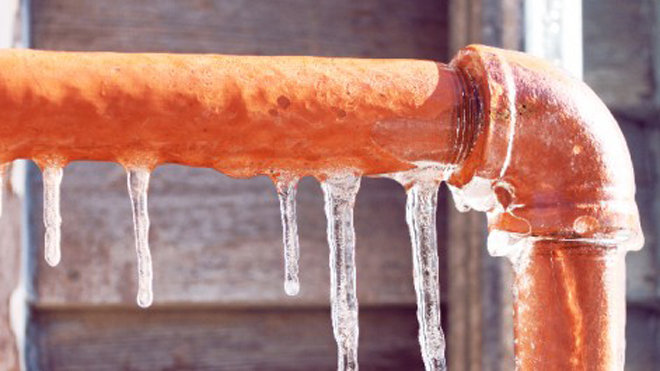Essential Strategies for Avoiding Frozen Pipes in Cold Weather
Essential Strategies for Avoiding Frozen Pipes in Cold Weather
Blog Article
Nearly everybody has their private theory in relation to How to prepare your home plumbing for winter weather.
:strip_icc()/snow-outdoor-faucet-pipes-4af65d1e5e904fb1aa7bf74071fe5d89.jpg)
Winter can wreak havoc on your plumbing, specifically by freezing pipelines. Here's just how to prevent it from happening and what to do if it does.
Introduction
As temperature levels decrease, the danger of frozen pipelines rises, possibly resulting in expensive fixings and water damages. Understanding how to prevent icy pipes is vital for house owners in chilly climates.
Recognizing Icy Pipelines
What creates pipes to ice up?
Pipelines freeze when revealed to temperatures listed below 32 ° F (0 ° C) for expanded durations. As water inside the pipes ices up, it broadens, putting pressure on the pipeline wall surfaces and potentially causing them to rupture.
Risks and problems
Icy pipes can result in water supply disturbances, building damage, and expensive repairs. Ruptured pipelines can flooding homes and create substantial structural damages.
Indications of Frozen Pipes
Recognizing icy pipelines early can avoid them from breaking.
Just how to identify frozen pipelines
Look for lowered water circulation from faucets, unusual odors or sounds from pipelines, and noticeable frost on revealed pipelines.
Prevention Tips
Shielding at risk pipelines
Cover pipes in insulation sleeves or utilize heat tape to shield them from freezing temperatures. Focus on pipes in unheated or exterior areas of the home.
Heating strategies
Keep interior rooms sufficiently warmed, particularly locations with pipes. Open cupboard doors to allow cozy air to circulate around pipelines under sinks.
Safeguarding Outdoor Plumbing
Garden hose pipes and exterior taps
Detach and drain yard pipes prior to wintertime. Mount frost-proof faucets or cover exterior faucets with shielded caps.
What to Do If Your Pipelines Freeze
Immediate actions to take
If you think frozen pipelines, keep taps open to relieve pressure as the ice thaws. Utilize a hairdryer or towels taken in warm water to thaw pipelines gradually.
Long-Term Solutions
Architectural changes
Consider rerouting pipelines away from outside walls or unheated locations. Add extra insulation to attics, cellars, and crawl spaces.
Upgrading insulation
Buy top quality insulation for pipes, attic rooms, and wall surfaces. Appropriate insulation aids maintain regular temperature levels and lowers the risk of frozen pipelines.
Final thought
Avoiding icy pipes requires positive steps and fast responses. By comprehending the reasons, indicators, and preventive measures, homeowners can secure their plumbing during winter.
Helpful Tips to Prevent Frozen Pipes this Winter
UNDERSTANDING THE BASICS: WHY PIPES FREEZE AND WHY IT’S A PROBLEM
Water freezing inside pipes is common during the winter months, but understanding why pipes freeze, and the potential problems it can cause is crucial in preventing such incidents. This section will delve into the basics of why pipes freeze and the associated problems that may arise.
THE SCIENCE BEHIND FROZEN PIPES
When water reaches freezing temperatures, it undergoes a physical transformation and solidifies into ice. This expansion of water as it freezes is the primary reason pipes can burst. As the water inside the pipe freezes, it expands, creating immense pressure on the walls. If the pressure becomes too great, the pipe can crack or rupture, leading to leaks and water damage.
FACTORS THAT CONTRIBUTE TO PIPE FREEZING
Low Temperatures: Extremely cold weather, especially below freezing, increases the risk of pipes freezing. Uninsulated or Poorly Insulated Pipes: Pipes located in unheated areas, such as basements, crawl spaces, or attics, are more prone to freezing. Insufficient insulation or lack of insulation altogether exacerbates the problem. Exterior Wall Exposure: Pipes running along exterior walls are susceptible to freezing as they encounter colder temperatures outside. Lack of Heating or Temperature Regulation: Inadequate heating or inconsistent temperature control in your home can contribute to frozen pipes. PROBLEMS CAUSED BY FROZEN PIPES
- Pipe Bursting: As mentioned earlier, the expansion of water as it freezes can cause pipes to burst, resulting in significant water damage.
- Water Damage: When pipes burst, it can lead to flooding and water damage to your property, including walls, ceilings, flooring, and personal belongings.
- Structural Damage: Prolonged exposure to water from burst pipes can compromise the structural integrity of your home, leading to costly repairs.
- Mold and Mildew Growth: Excess moisture from water damage can create a favorable environment for mold and mildew growth, posing health risks to occupants.
- Disrupted Water Supply: Frozen pipes can also result in a complete or partial loss of water supply until the issue is resolved.
WHY CERTAIN PIPES ARE MORE PRONE TO FREEZING
- Location: Pipes located in unheated or poorly insulated areas, such as basements, crawl spaces, attics, or exterior walls, are at higher risk of freezing.
- Exterior Pipes: Outdoor pipes, such as those used for irrigation or exposed plumbing, are particularly vulnerable to freezing as they are directly exposed to the elements.
- Supply Lines: Pipes that carry water from the main water supply into your home, including the main water line, are critical to protect as freezing in these lines can affect your entire plumbing system.
- Underground Pipes: Pipes buried underground, such as those connected to sprinkler systems or outdoor faucets, can be susceptible to freezing if not properly insulated.
https://busybusy.com/blog/helpful-tips-to-prevent-frozen-pipes-this-winter/

As a person who reads about How to Prevent Your Pipes From Freezing, I assumed sharing that piece was worth the trouble. Do you know about another individual who is fascinated with the niche? Do not hesitate to promote it. Thank you for being here. Revisit us soon.
Check Us Out Report this page